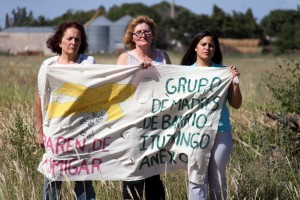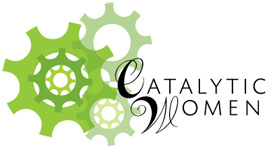 This month, I joined the Advisory Board of Catalytic Women-—a consortium of philanthropy professionals who bring practical experience to helping individuals, companies and foundations create giving strategies for maximum impact in their communities and world. Catalytic Women was founded by Melanie Hamburger and is driven by her vision for creating a community of women who are influential decision-makers in wealth and philanthropy. Catalytic Women offers webinars, a rich online library of resources, intimate events and personalized consulting. I am delighted to join the company of the great women Melanie has gathered for the greater good.
This month, I joined the Advisory Board of Catalytic Women-—a consortium of philanthropy professionals who bring practical experience to helping individuals, companies and foundations create giving strategies for maximum impact in their communities and world. Catalytic Women was founded by Melanie Hamburger and is driven by her vision for creating a community of women who are influential decision-makers in wealth and philanthropy. Catalytic Women offers webinars, a rich online library of resources, intimate events and personalized consulting. I am delighted to join the company of the great women Melanie has gathered for the greater good.
Women as catalysts for broad global change
Homeless No More
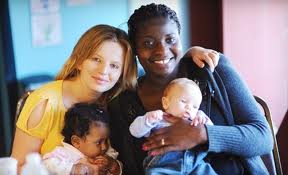 Homeless Prenatal Project (HPP), a San Francisco nonprofit whose work I greatly admire, announced today that five more women successfully completed their year-long Community Health Worker Training Program. This highly competitive program prepares economically disadvantaged women for employment and its success rate is terrific. Since 1995, there have been 132 graduates of the program, 92% of whom found full-time employment, with benefits, within 30 days of finishing the program. This success is just one of many achieved by HPP under the remarkable leadership of Martha Ryan. Others include ending homelessness for 2,160 families in the last six years alone and helping HPP clients deliver more than 2,160 babies, 95.5% of whom were drug-free. Take a moment to learn more if ending childhood poverty in SF speaks to your heart as it does mine.
Homeless Prenatal Project (HPP), a San Francisco nonprofit whose work I greatly admire, announced today that five more women successfully completed their year-long Community Health Worker Training Program. This highly competitive program prepares economically disadvantaged women for employment and its success rate is terrific. Since 1995, there have been 132 graduates of the program, 92% of whom found full-time employment, with benefits, within 30 days of finishing the program. This success is just one of many achieved by HPP under the remarkable leadership of Martha Ryan. Others include ending homelessness for 2,160 families in the last six years alone and helping HPP clients deliver more than 2,160 babies, 95.5% of whom were drug-free. Take a moment to learn more if ending childhood poverty in SF speaks to your heart as it does mine.
Ludicrous and dangerous…
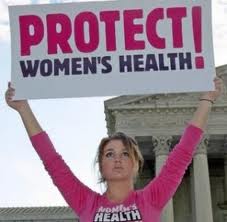 Reverend William E. Lori, spokesman for the U.S. Conference of Catholic Bishops, recently argued before Congress that “contraception is no more essential to women than a ham sandwich.” Seriously? There are 62 million U.S. women in their childbearing years (ages 15 to 44). Seven in 10 women of reproductive age (43 million women) are sexually active and do not want to become pregnant, but could become pregnant if they and their partners fail to use a contraceptive method. As preventive health care, birth control works. Not sure what ham sandwiches do, but if that kind of ludicrous testimony outrages you too, consider joining The Center for Reproductive Rights’ efforts to protect the separation between church and state.
Reverend William E. Lori, spokesman for the U.S. Conference of Catholic Bishops, recently argued before Congress that “contraception is no more essential to women than a ham sandwich.” Seriously? There are 62 million U.S. women in their childbearing years (ages 15 to 44). Seven in 10 women of reproductive age (43 million women) are sexually active and do not want to become pregnant, but could become pregnant if they and their partners fail to use a contraceptive method. As preventive health care, birth control works. Not sure what ham sandwiches do, but if that kind of ludicrous testimony outrages you too, consider joining The Center for Reproductive Rights’ efforts to protect the separation between church and state.
Babies, babies, everywhere
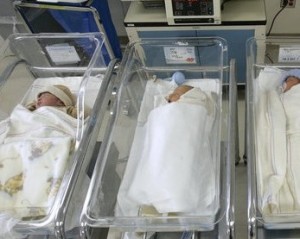 The Census Bureau reported today that minority births in the U.S. now constitute a majority of births in the nation. Of equal importance to the nonprofit sector is the fact that children of immigrants are the fastest growing sector of the American youth population–making up nearly a quarter of the U.S. youth population in 2009 and projected to comprise fifty percent by 2040. Brown University researchers are among many nationwide seeking to understand “what fosters success in the lives of children of immigrants so that we can (1) provide these supports for those who are beginning to deteriorate or are not showing resilient outcomes and (2) foster the development of these supports in subsequent generations.” Today’s population data reinforces the need for creative responses from service providers and for donors to help support leadership development among this promising group of young people.
The Census Bureau reported today that minority births in the U.S. now constitute a majority of births in the nation. Of equal importance to the nonprofit sector is the fact that children of immigrants are the fastest growing sector of the American youth population–making up nearly a quarter of the U.S. youth population in 2009 and projected to comprise fifty percent by 2040. Brown University researchers are among many nationwide seeking to understand “what fosters success in the lives of children of immigrants so that we can (1) provide these supports for those who are beginning to deteriorate or are not showing resilient outcomes and (2) foster the development of these supports in subsequent generations.” Today’s population data reinforces the need for creative responses from service providers and for donors to help support leadership development among this promising group of young people.
When Less is More
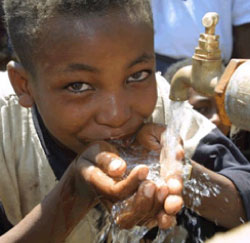 In an interesting example of corporate philanthropy Levi Strauss has teamed up with Water.org (and celebrity spokesperson Matt Damon) to raise awareness of the one billion people in the world who do not have access to clean water and Levi’s own manufacturing enhancements aimed at saving water. The Go Water < Less campaign is an effort to “give to others what we take for granted” and may result in three positive outcomes for Levi’s: sustainability of the company’s reputation for corporate social responsibility, enhancement of employee pride, and most importantly, the chance to make a difference for those who suffer from lack of access to this most basic resource.
In an interesting example of corporate philanthropy Levi Strauss has teamed up with Water.org (and celebrity spokesperson Matt Damon) to raise awareness of the one billion people in the world who do not have access to clean water and Levi’s own manufacturing enhancements aimed at saving water. The Go Water < Less campaign is an effort to “give to others what we take for granted” and may result in three positive outcomes for Levi’s: sustainability of the company’s reputation for corporate social responsibility, enhancement of employee pride, and most importantly, the chance to make a difference for those who suffer from lack of access to this most basic resource.
The Goldman Environmental Prize
Reclaiming Our Rights
 If it seems to you that the assault on reproductive rights has accelerated in the past year, you are not mistaken. The Center for Reproductive Rights (The Center) notes that “in 2011 alone, legislatures across the U.S. passed more than 60 laws undermining reproductive rights protected by the U.S. Constitution, choking off access to critical reproductive health services and making rights that exist on paper increasingly difficult to exercise in reality.” The Center is the only global legal advocacy organization dedicated exclusively to the establishment, protection, and advancement of reproductive rights in constitutional and international law. To learn more about the 61 million women each year who lack adequate maternal and newborn care and what The Center is doing on their behalf, click here.
If it seems to you that the assault on reproductive rights has accelerated in the past year, you are not mistaken. The Center for Reproductive Rights (The Center) notes that “in 2011 alone, legislatures across the U.S. passed more than 60 laws undermining reproductive rights protected by the U.S. Constitution, choking off access to critical reproductive health services and making rights that exist on paper increasingly difficult to exercise in reality.” The Center is the only global legal advocacy organization dedicated exclusively to the establishment, protection, and advancement of reproductive rights in constitutional and international law. To learn more about the 61 million women each year who lack adequate maternal and newborn care and what The Center is doing on their behalf, click here.
Call Me Hope
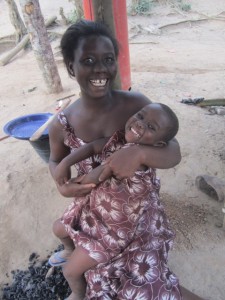 Just learned about Mama Hope, a young nonprofit in San Francisco. Two things about them caught my eye: a short music video they posted online and this, “At Mama Hope, we believe that the essential first step in changing the world is telling the story of connection instead of contrast and potential instead of poverty. People everywhere have talent and capacity, and people everywhere share a desire to be able to use those gifts to improve their lives and the lives of the people they care about.” Reposting their upbeat message just feels like the right thing to do on a day when the news of the world has been so dire. Special thanks to A Band of Wives for bringing this to my attention.
Just learned about Mama Hope, a young nonprofit in San Francisco. Two things about them caught my eye: a short music video they posted online and this, “At Mama Hope, we believe that the essential first step in changing the world is telling the story of connection instead of contrast and potential instead of poverty. People everywhere have talent and capacity, and people everywhere share a desire to be able to use those gifts to improve their lives and the lives of the people they care about.” Reposting their upbeat message just feels like the right thing to do on a day when the news of the world has been so dire. Special thanks to A Band of Wives for bringing this to my attention.
Pray the Devil Back to Hell
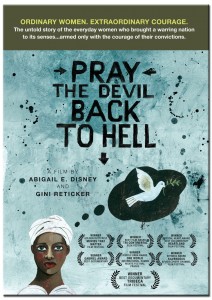 I recommend seeing “Pray the Devil Back to Hell,” an extraordinary documentary about a small group of Liberian women who, against all odds, helped win a long-awaited peace for their shattered country in 2003. When I say “against all odds” what I really mean is “in the face of the extraordinarily brutal violence perpetuated by Liberia’s then president Charles Taylor and the warlords who opposed him.” This is the story of courageous women and their desperate prayer for peace triumphing over terror, greed and a horrifying arsenal of weaponry and violence. It sets the mind to rethinking what is possible…My thanks to AJWS for screening the film throughout the Bay Area.
I recommend seeing “Pray the Devil Back to Hell,” an extraordinary documentary about a small group of Liberian women who, against all odds, helped win a long-awaited peace for their shattered country in 2003. When I say “against all odds” what I really mean is “in the face of the extraordinarily brutal violence perpetuated by Liberia’s then president Charles Taylor and the warlords who opposed him.” This is the story of courageous women and their desperate prayer for peace triumphing over terror, greed and a horrifying arsenal of weaponry and violence. It sets the mind to rethinking what is possible…My thanks to AJWS for screening the film throughout the Bay Area.
Where Do You Give?
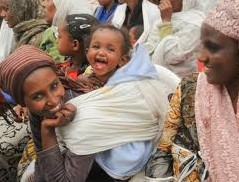 American Jewish World Service (AJWS) is stimulating an important conversation through their “Where Do You Give” campaign. Noting that the connectedness of the world makes it as easy to give to a project 10,000 miles away as it is to give to your local food bank, AJWS is asking two questions: “Does the accessibility we enjoy through the Internet and the preponderance of information available to us actually make us better donors? And what is the role of those who provide guidance and context when information alone is not enough to inform wise giving decisions?” My experience overwhelmingly points to the value of trusted advisors and intermediaries like AJWS and Global Fund for Women (who are especially helpful when you are making international gifts to NGOs without fiscal sponsors or 501(c)(3) status). One thoughtful contribution to the conversation can be read here. I look forward to reading more.
American Jewish World Service (AJWS) is stimulating an important conversation through their “Where Do You Give” campaign. Noting that the connectedness of the world makes it as easy to give to a project 10,000 miles away as it is to give to your local food bank, AJWS is asking two questions: “Does the accessibility we enjoy through the Internet and the preponderance of information available to us actually make us better donors? And what is the role of those who provide guidance and context when information alone is not enough to inform wise giving decisions?” My experience overwhelmingly points to the value of trusted advisors and intermediaries like AJWS and Global Fund for Women (who are especially helpful when you are making international gifts to NGOs without fiscal sponsors or 501(c)(3) status). One thoughtful contribution to the conversation can be read here. I look forward to reading more.
